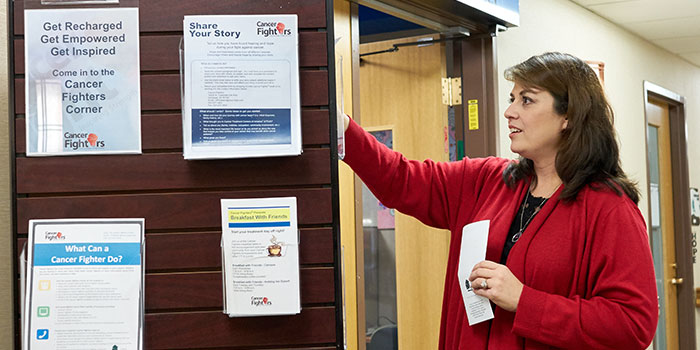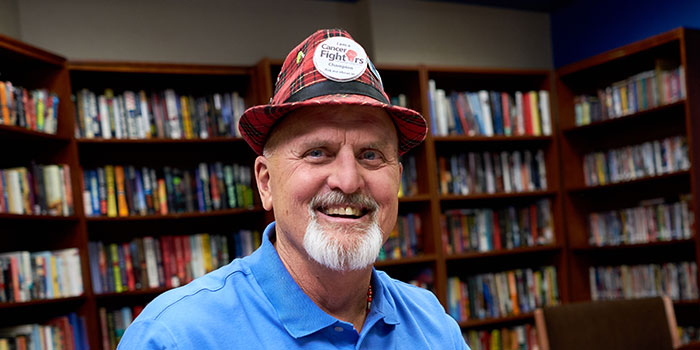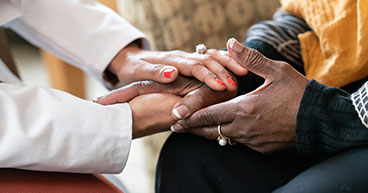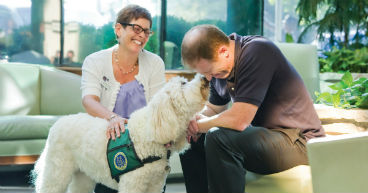
After a cancer diagnosis, it’s common to feel isolated and anxious about your new circumstances. You may feel like no one else understands what you’re experiencing—emotionally or physically. You may not know how to talk to family members and friends about your disease or your feelings. You may have questions about how to deal with the side effects of your treatment, such as fatigue, pain or loss of appetite. You may be frustrated that you can’t do everything you used to do before your diagnosis and wonder if life will ever go back to normal.
While it’s true that you’re going through a unique experience, finding a support group for cancer patients may be a helpful step toward relieving feelings of loneliness and isolation and finding a resource for practical coping skills to improve your quality of life during treatment and into survivorship.
Support groups for cancer patients come in many different shapes and sizes. Options may include:
- Groups for cancer patients in general
- Groups for patients with specific types of cancer
- Groups for patients and/or their families and caregivers
- Online support groups
- Peer-to-peer support groups
The format of these groups may vary as well. Each session may focus on a particular issue, or it may offer an open forum, where patients and/or their caregivers discuss any topic related to treatment, wellness or caregiving.
No matter what the format, an oncology support group should be a place where you feel safe and comfortable. If you’re uncomfortable talking to others about your feelings, it may ease your worries to know that you can still benefit by simply listening to others' experiences and advice. You don’t have to share unless you’re comfortable doing so.
With so many choices, how do you find a support group for cancer patients that’s right for you? To help you sort through your options, this article will guide you through:
- The benefits of support groups for cancer patients
- Types of cancer support groups
- How to find a quality cancer support group
Throughout this post, we’ll draw on examples from our experience as licensed behavioral health care professionals providing care to cancer patients undergoing treatment at Cancer Treatment Centers of America® (CTCA). If you’re interested in learning more about getting cancer care from our team of experts, call us or chat online with a member of our team.
Benefits of support groups for cancer patients
Your doctors and care team are experts at treating cancer, but they may be limited in their knowledge of what undergoing cancer treatment actually feels like and in their ability to offer practical solutions to the difficulties of daily life. Some cancer centers, like CTCA®, provide supportive care therapies to help patients manage difficult treatment-related side effects. Services we provide in addition to behavioral health services, for example, include nutritional support, pain management, oncology rehabilitation and spiritual support. Access to support groups may be included in these support services. If you don’t have access to this type of supportive care where you’re being treated, cancer support group members and leaders may be able to fill some gaps with their valuable experience and firsthand knowledge.
The benefits of support groups for cancer patients may include:
The comfort of being in safe hands
Professionally led cancer support groups are designed to offer you the assurance that the group and its discussions are being guided by leaders with real expertise in their area. The facilitator is often a licensed professional with experience and credentials in leading support groups for cancer. The professional may set a specific agenda for each meeting, enforce respectful boundaries and moderate discussions. This guidance may help participants understand what information may be beneficial, or it may temper potentially harmful information. This may also make a support group a good place to check cancer information and advice you’ve heard from others.
Emotional support and connection
Meeting with others facing a cancer diagnosis and treatment may make you feel less alone and more hopeful about your situation. Cancer support groups offer you an opportunity to talk about your feelings and experiences and to make connections with others experiencing a similar situation. As behavioral health therapists at CTCA, we find that the anxiety patients sometimes feel when attending a group for the first time is often quickly relieved because they feel part of a bigger group of people dealing with a common problem. Connecting with a group of patients in this way may provide a sense of normalcy when you meet others who have similar thoughts, reactions, worries and concerns.
Practical help with side effects and coping skills
A support group may be a healthy place to find and share ways of coping with treatment side effects and other cancer-related difficulties. You may be suffering from so-called “chemo-brain,” for example, in which patients undergoing chemotherapy and other treatments experience brain fog or other cognitive changes, and a group may be a good place to discover coping strategies for that. If you’re a breast cancer patient, a breast cancer support group may provide support to help with your changing body image or advice about how to cope with lymphedema. A prostate cancer patient may benefit from advice about how to deal with urinary incontinence or sexual intimacy challenges.
Relaxation and meditation techniques to reduce stress and improve sleep are other possible topics of discussion. It may help alleviate your concerns to get tips for dealing with new challenges in daily life from other patients who’ve already dealt with similar issues.
Financial considerations
Joining a cancer support group may also provide a financial benefit. The cost of attending a support group is often less than the cost of individual counseling. Nonprofit organizations may offer support groups, for anyone currently affected by cancer, at no charge or for a reduced fee. The Leukemia & Lymphoma Society, for example, sponsors local support groups for patients and their families at no charge. The International Myeloma Foundation is another nonprofit that connects multiple myeloma patients with local support groups and regional seminars.
At CTCA, we offer behavioral health services that are designed to support patients before, during and after cancer treatment. These services include support groups for cancer patients, led by our licensed mental health and allied professionals, as part of our integrative approach to cancer care, at no additional cost.
Types of support groups

It may be confusing at first trying to decide what type of support you need and where to seek it out. It may help to think about what’s important to you.
Do you want a support group that’s led by a licensed therapist? Perhaps you’re looking for some more general educational information and advice you can implement yourself. Is an online meeting an option for you, or would you prefer a face-to-face group?
Two main categories of support groups available to cancer patients and their loved ones are professionally facilitated support groups and peer-to-peer support groups.
Professionally led support groups
A licensed professional leading a support group for cancer may provide peace of mind by setting rules and boundaries for the way the group functions and ensuring they’re followed. Maintaining these standards allows those who attend the group to feel safe in the knowledge that their participation is confidential and what’s shared is kept within the confines of the group. Professionally led cancer support groups are offered both in person and online.
While licensed, experienced therapists may facilitate professionally led support groups, it’s important to realize that support groups don’t take the place of individual therapy. Some patients may have issues that are better suited for private counseling. If a therapist facilitating a group recognizes such a need, he or she may provide a referral for these patients. In these situations, a support group may serve as a compliment to individual therapy.
Face-to-face cancer support groups
Face-to-face support groups are the more traditional format. They may be offered at medical centers where patients receive treatment or in other community settings.
Face-to-face groups have the obvious benefit of seeing people in person, which makes communication and empathy with others easier and more direct. Connections may feel more genuine when meetings are held face-to-face. It’s a more natural environment to feel a sense of camaraderie and group support.
Online cancer support groups
The COVID-19 pandemic has led to an increase in the number of professionally led support groups offered online. Cancer patients sheltering from the coronavirus at home may feel more comfortable with virtual support groups, which reduce their risk of exposure. Online support groups are not new, though. They’ve been around for some time and may be of benefit to cancer patients and caregivers even in more “normal” times. For example, those who need to travel a significant distance for treatment may only be able to attend meetings when they coincide with treatment days, whereas online meetings may be accessed on a more regular basis.
Cancer and its treatments may leave cancer patients fatigued as the body rallies to repair itself. This may sometimes leave patients exhausted and unable to attend in-person cancer support groups, but online options allow them to take part even from home.
Virtual meetings may also be a good option for those with social anxieties or who feel vulnerable about revealing their feelings. Participants are allowed to be as involved as they like in group meetings, and video-conferencing technology allows attendees to listen in, either with their camera turned on or off, and only join the conversation when they feel comfortable.
One thing to consider before looking for a professionally facilitated online support group is that therapists are bound by state licensure restrictions. Be sure to check to see if you’re eligible to join based on the regulations guiding the community you live in.
Peer-to-peer support groups and forums

Peer-to-peer cancer support is available through face-to-face groups, online groups and online forums and message boards. This type of support is offered by many highly regarded, national cancer nonprofits, such as the American Cancer Society and Cancer Support Community. The scope of peer-to-peer groups is more general, and groups may be led by trained members who have been through their own cancer journey.
This type of support group offers education, information and advice to cancer patients and their loved ones and is a way to get support or to give support to others, if you’re willing and able, as part of a dynamic community, often throughout the country. Because peer-to-peer programs don’t offer clinical or medical treatment or support, they’re available nationwide, regardless of geographical residence.
Cancer Fighters, founded in 1990 for CTCA patients by CTCA patients, is an example of a high-quality psychoeducational and psychosocial support group. It's free to anyone impacted by cancer and provides a range of discussion boards, online groups, virtual activities and educational resources. Members can ask questions and join in discussions on a variety of cancer-related issues. The site was founded on the idea that nobody should have to fight cancer alone. It connects cancer patients and caregivers needing support with others who’ve been through a similar experience. The Cancer Fighters community is continually growing and currently includes over 40,000 people.
How to find a quality support group
If you decide a support group may be helpful to you or a loved one, how should you go about finding a reputable, high-quality group?
- A good place to start is by asking about support groups at the facility where you’re getting your cancer care. If they don’t provide that resource, other local hospitals may have open support groups, so it’s worth checking with them.
- To broaden your options further, an online search may point you to reputable providers of cancer support groups in your area, but be sure to verify you’re eligible to attend the groups that appear in your search.
- Once you’ve identified a potential group, ask if the group is licensed to provide support in your geographical area. Professionally facilitated groups are known to provide clinical services, limiting them to offering support to residents of the area where they’re licensed to practice. This applies to both online and face-to-face cancer support groups.
- Once you’ve established that you can attend, make sure to check on the rules and regulations of the group. Are they laid out in a document? How does the facilitator establish and enforce those rules? Do members sign a confidentiality agreement?
- Research the credentials of the leader of the support group. These should be provided, along with a short professional bio. How much experience does the facilitator have? Is it enough to expertly address the issues you’re dealing with in a group support context? Look for reviews of the organization as well. Negative reviews may be a red flag.
Although this process may seem lengthy and daunting, the time and effort it takes should be worthwhile. Finding the right cancer support group for your needs may be transformative for your quality of life. As licensed therapists leading cancer support groups, we’ve seen patients’ apprehensions melt away as they share a sense of vulnerability together. Whatever support group you choose, it should be a place where you feel safe, heard and protected while also providing you with practical skills and information.
If you’re interested in learning about our integrative approach to cancer care, or if you’d like to talk to someone at CTCA about your treatment options, call us or chat online with a member of our team.



